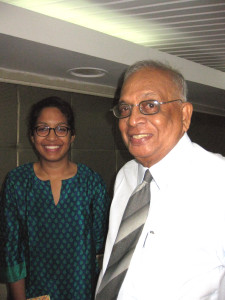Registered with the Registrar of Newspapers for India under R.N.I 53640/91
Vol. XXIX No. 4, June 1-15, 2019
To Grand-uncle with love
Radha Subramaniam is an Associate Film Producer in New York

My first memory of Muthu Aiyah, my maternal great uncle, was of a jovial, thoughtful man who could be sharp if he felt you were being facetious. He was never one to play to expectations and he expected you to be thoughtful when you were speaking with him. But he was also one amongst many elder relatives who I spent time with every summer. I don’t remember thinking of him with any type of specificity until the summer before I turned thirteen, when I went to see a lecture of his on Madras architecture.
It was a version of his classic lecture pulled from Madras Rediscovered, a lecture that I would hear many versions of over the next fifteen years. Until that point, I came to India every summer, feeling listless and despondent about the heat, the water, the food, and the relatives who were impossible to pick apart but all seemed to ask the same boring questions to every child they came across. But for some reason, that day, I was more engaged. I took copious notes during the lecture and later cross-referenced them against a recent edition of Madras Rediscovered before sitting down with my grandfather and planning out an ambitious tour of all of the major architecture of Madras. We spent days going to government buildings, museums, churches, and monuments – crossing from one end of the city to the other to enter often empty buildings maintained by quiet caretakers. I discovered a wealth of history and culture that I never could have imagined, feeling like I had opened the door into a hidden world that only Muthu Aiyah was privy to. At the end of that trip, I excitedly went to tell him about all of the visits I had made and how fascinating it all was. I remember how his eyes lit up and he talked with glee about the importance of remembering this history.
From that summer on, his house was always one of my first stops when I got to Madras. I would tag along to lectures on military history and sports, architecture and art, book clubs and film clubs. I was his little shadow in a churidhar and braids, with an odd American accent and, as he used to say, marbles in my mouth. But we were kindred spirits. I don’t think I ever met anyone who understood me the way he did – both my curiosity and my insecurities. He was never condescending, even though I was very young and a girl. Instead, he encouraged me and challenged me and expected me to engage like an adult.
I last saw him in December and was awed at his strength and fortitude even in the face of his illness. When my father called to tell me that Muthu Aiyah had died, I felt an immense sense of loss. But the more I reflected on it, the more I realized that he had one of fullest lives of anyone I have ever known. He touched more people and was more unselfish with his time than any three people combined. The impact of his writing, his talks, his advice, and his kindness will be evident in the city’s newspapers, books, and history for a long time to come. And his legacy is one of openness and generosity – a spirit that I hope to hold onto and apply to my own life. If I can have even a quarter of the impact that he had on this world, I will be proud of what I have given back to the people and institutions that are a part of my life. Muthu Aiyah, you are dearly missed, but never forgotten.

